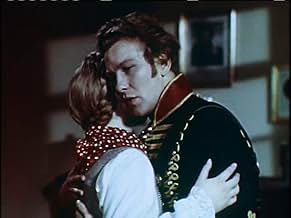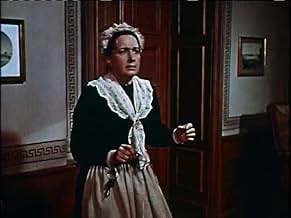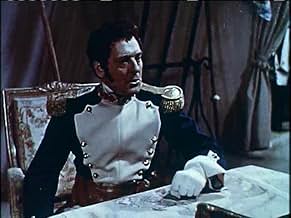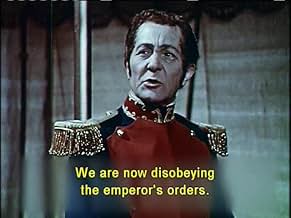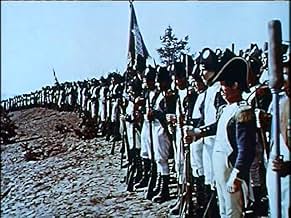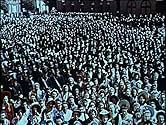Aggiungi una trama nella tua linguaDuring Napoleon's German campaign, the city of Kolberg is isolated from Prussian forces. Residents organize resistance against the French army besieging and bombarding the city, refusing to ... Leggi tuttoDuring Napoleon's German campaign, the city of Kolberg is isolated from Prussian forces. Residents organize resistance against the French army besieging and bombarding the city, refusing to surrender.During Napoleon's German campaign, the city of Kolberg is isolated from Prussian forces. Residents organize resistance against the French army besieging and bombarding the city, refusing to surrender.
- Regia
- Sceneggiatura
- Star
- Zaufke
- (as H.H. Schaufuss)
- Fanselow
- (as F. Schafheitlin)
- französischer Offizier
- (as St. Germain)
Recensioni in evidenza
The film is an awesome piece of spectacle especially when you consider the money spent and the manpower appropriated from the battlefield by Dr. Goebbels to be extras, playing being French and Prussian soldiers for the camera and missing the real war where doubtless a lot of them would be killed. I wouldn't be surprised if a lot of candles were lit for Goebbels in many German households today because of it.
The story is after Austerlitz Napoleon pretty much had the run of things in Europe for a while. In his march toward Russia he met this incredible resistance from the former Hanseatic League town of Kolberg. Inspired by its mayor played by Heinrich George and Horst Caspar as General Gneissenau the place held out against incredible odds until the Treaty of Tilsit was signed, one of the few places in the future united Germany to do so. A whole lot like the way the City of Leningrad held out for years against the Nazis invading though that was a comparison the Third Reich would not be making.
George who was a favorite and favored player during the Third Reich is brilliant as Mayor Joachim Nettelbrick who spent as much time battling with Paul Wegener as the first commandant of the garrison as with the French. I had to think about that one for a bit, but it occurred to me that Hitler would probably have liked the citizen mayor showing up the professional army man as George continually does. After he was just a corporal and had conquered most of Europe against the advice of most of his generals. Of course then Gneissenau who is an ideal Aryan teams up with the mayor and they triumph.
The battle scenes populated with extras who were thanking whatever Gods they worshiped that they were not in the real war only miles away are staged brilliantly. The message of Kolberg is resistance and none of the other Nazi prejudices made its way into the film.
Veit Harlan one of the Third Reich's favored directors brought this one in which in Hollywood would have had the studio bean counters tearing the hair out of their heads. Krista Soderbaum who was the symbol of blond Aryan womanhood and Harlan's wife is also in the film who sustains several tragic losses, but carries on.
In a booklet that accompanied the DVD of Kolberg I ordered it pointed out the film did not have quite the impact that Goebbels thought it would after its Berlin premiere on January 30, 1945. First of all it had limited bookings because 90% of the theaters in Germany had been destroyed by Allied bombings. And by the time it came out the people were really not responding too well to the Propaganda Ministry's pablum.
I have to say that this last film from Goebbels is brilliantly conceived and executed. But after World War II Kolberg became and remains part of Poland with its German population expelled or worse by the Russian Army and Polish resistance. So what was it all about?
Goebbels film studios managed to film and distribute this movie just as the final battles of World War II were being fought. Its message of defiant defense in the face of hopeless odds was meant to rally the severely demoralised Germans as their homes were being threatened by the enemy. The songs and vivid colours were meant to entertain and raise morale as life became darker and darker.
Technically, its a masterpiece, and makes use of all kinds of modern shots, angles, and special effects. Its colours were terrible, though, but I trust it was the copy I saw. Of course, it might have been a result of the war constraints.
Seen in this context, this film is even more interesting than the entertaining story it presents.
Jurched
That aside, 'Kolberg' is a marvellous piece of film-making. Beautifully shot in Agfacolor by Bruno Mondi with a powerful score by Norbert Schultze and intensely moving performances by some of Germany's finest.
The three leading characters of Gniesenau, Nettlebeck and Maria are basically symbols, respectively, of inspired military leadership, nationalist fervour and supreme sacrifice. Indeed, Gniesenaus' 'The people rise...the storm breaks' echos Goebbel's 'total war' speech from 1943.
Whatever one's feelings regarding demonised director Veit Harlan and the monstrous masters he served this film nonetheless remains an essential piece of cinematic history which no true cinephile can dismiss.
The film is set during the Napoleonic Wars--back around 1807. Town after Prussian town have surrendered to the oncoming French juggernaut. Yet, inexplicably, the town of Kolberg isn't ready to welcome the invaders. Despite a very weak commander of the Prussian army in the region, the Mayor isn't about to surrender and he's encouraging his people to fight to the death, as by slowing down the enemy, ultimate victory may result. But, he must contend with the wimpy commander and send a rather ordinary lady on a mission to have the King replace the commander and support the defense of the city. What follows are some exceptional battle scenes and the only ones which I have seen which are better are from the insanely large Russian version of "War and Peace" (a film you just have to see at least once in your life).
Overall, the film is very rousing and inspiring. It's obvious that the purpose of the film is to get the German people to be very willing to lay down their lives as well as convince them that this is not a sacrifice in vain (which is was). As a result, the film probably contributed to the unnecessary deaths of thousands of people--when there was no possible way to stop the inevitable. Plus, unlike the Prussians during the time of Napoleon, they were NOT fighting for what was right. Sad...but amazingly effective...provided the local movie houses had not been blown up so the folks could see it in the first place! By the way, the scene where the peasant girl meets the queen was exceptionally well done--even brilliant. See this and you'll understand what I mean.
Lo sapevi?
- QuizFeatured 15,000 to 20,000 actual German troops in the battle scenes, even as Germany's eastern and western fronts were collapsing. The director tried to make the shooting longer to save them from being sent to the front.
- BlooperSaxony didn't separate itself from the Holy Roman Empire. It was separated after the Rheinbund was founded in 1806, to which Saxony was included later. Also, in the movie the inclusion of Saxony is mentioned by King Franz II. In real life it didn't happen until December, almost four months after Franz's resignation.
- Citazioni
Bürgermeister Nettelbeck: [after Gneisenau asks Nettelbeck to surrender] You weren't born in Kolberg, Gneisenau. You are put here to Kolberg. But we grew up here. We know every stone, every corner every house here. We don't let go. Even if we have to claw in the ground of our city with our nails, we don't let go. First they have to cut off each of our hands or kill us one after the other. Gneisenau, you can't put the whole disgrace on an old man like me. and to give our city to Napoleon. I even promised our king: rather be buried below the ruins that capitulate. Gneisenau, Gneisenau, I never stand on my knees for anyone, now i'm doing it: Kolberg can't be given up, Gneisenau!
Gen. Gneisenau: That's what I wanted to hear from you, Nettelbeck. Now we can die together.
- ConnessioniEdited into Der 30. Januar 1945 (1965)
- Colonne sonoreEin Volk steht auf
I più visti
- How long is Burning Hearts?Powered by Alexa
Dettagli
Botteghino
- Budget
- 8.800.000 DEM (previsto)
- Tempo di esecuzione1 ora 51 minuti
- Mix di suoni
- Proporzioni
- 1.37 : 1
Contribuisci a questa pagina


